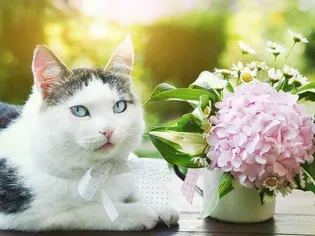Are Hydrangeas Poisonous to Cats?
Updated on 04/26/24

Are Hydrangeas Poisonous to Cats? Unraveling the Truth Behind a Common Garden Conundrum
Introduction
The captivating allure of hydrangeas, with their mesmerizing blooms and vibrant hues, has made them a beloved garden staple for many. However, amidst their beauty lies a crucial question for cat owners: are hydrangeas poisonous to our feline companions? This blog post delves into the intricate details surrounding this topic, providing a comprehensive guide to protect your beloved cats from any potential harm.
Understanding the Toxicity of Hydrangeas
Hydrangeas belong to the genus Hydrangea, which encompasses over 70 species and numerous varieties. While the toxicity of hydrangeas has been debated, scientific evidence suggests that they do indeed possess toxic properties that can be harmful to cats. The toxic compound in hydrangeas is cyanogenic glycosides, which, when ingested, can release cyanide.
Symptoms of Hydrangea Poisoning in Cats
Cyanide poisoning in cats can manifest in various ways. The severity of symptoms depends on the amount of cyanogenic glycosides ingested. Common symptoms include:
* Vomiting
* Diarrhea
* Abdominal pain
* Weakness
* Dilated pupils
* Difficulty breathing
* Seizures
* Coma
Which Parts of Hydrangeas are Toxic?
All parts of the hydrangea plant, including the leaves, stems, flowers, and roots, contain cyanogenic glycosides. However, the leaves and flowers are considered to be the most toxic.
Examples of Hydrangea Poisoning in Cats
Documented cases of hydrangea poisoning in cats are relatively rare but not unheard of. Here are two examples:
* In one instance, a cat ingested a large quantity of hydrangea leaves and experienced severe vomiting, diarrhea, and abdominal pain. The cat was treated with activated charcoal and supportive care and made a full recovery.
* In another case, a cat chewed on hydrangea flowers and developed difficulty breathing and seizures. The cat was rushed to a veterinary clinic and treated with oxygen therapy and anti-seizure medication. The cat eventually recovered but suffered long-term neurological damage.
Factors Affecting Toxicity
The toxicity of hydrangeas in cats can vary depending on several factors:
* Species and variety: Some hydrangea species are more toxic than others.
* Age and size: Kittens and smaller cats are more susceptible to the effects of hydrangea poisoning.
* Amount ingested: The amount of cyanogenic glycosides ingested determines the severity of poisoning.
* Individual sensitivity: Some cats may be more sensitive to hydrangeas than others.
Prevention and Treatment of Hydrangea Poisoning
To prevent hydrangea poisoning in cats, it is crucial to:
* Keep cats away from hydrangeas and remove them from your yard or home.
* Educate children about the dangers of hydrangeas for cats.
* Supervise cats when they are outdoors.
If you suspect your cat has ingested hydrangeas, seek veterinary attention immediately. Treatment will depend on the severity of poisoning and may include:
* Inducing vomiting: To remove any remaining hydrangea material from the stomach.
* Administering activated charcoal: To absorb the toxic compounds.
* Providing supportive care: Such as IV fluids, oxygen therapy, and anti-seizure medication.
Conclusion
While hydrangeas offer a captivating display in gardens, it is essential to be aware of their potential toxicity to cats. By understanding the risks, taking preventive measures, and seeking veterinary care promptly if needed, you can help protect your feline companions from the harmful effects of hydrangea poisoning. Remember, the well-being of your cats should always come first, ensuring their safety and happiness in your loving home.
Explore More Pets

Cat Behavior Problems
How to Stop Aggression in Kittens

Long-Haired Cat Breeds
Siberian Cat: Breed Profile, Characteristics, & Care

Cat Behavior Problems
How to Stop Kittens From Scratching and Biting

Long-Haired Cat Breeds
Turkish Angora: Cat Breed Profile, Characteristics & Care

Basic Training
How to Socialize Your Kitten

Short-Haired Cat Breeds
Cute Pictures & Facts About Calico Cats & Kittens

Litter Box Training
Training Your Kitten to Use the Litter Box

Long-Haired Cat Breeds
10 Fun Facts About White Cats